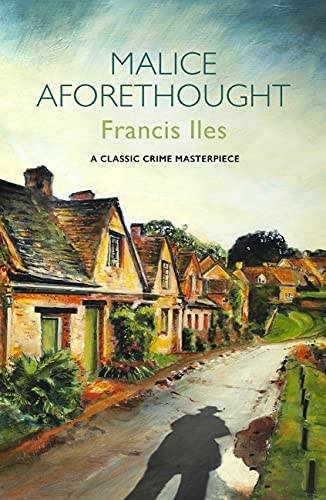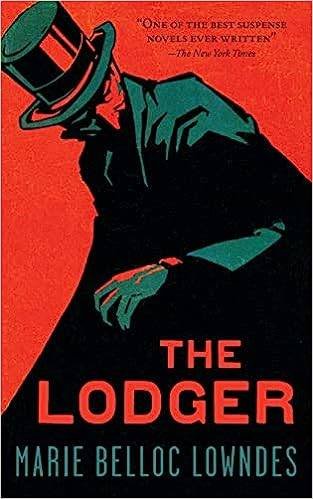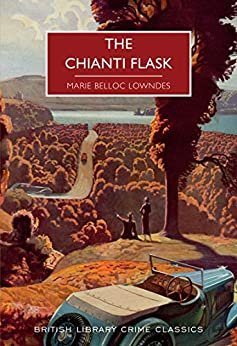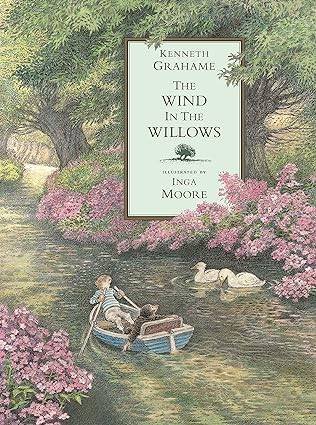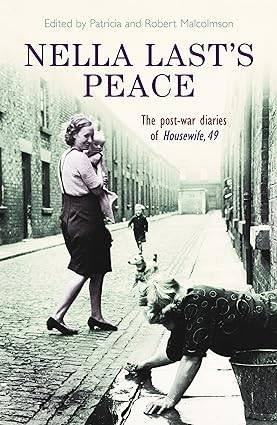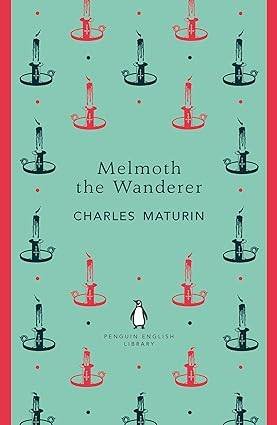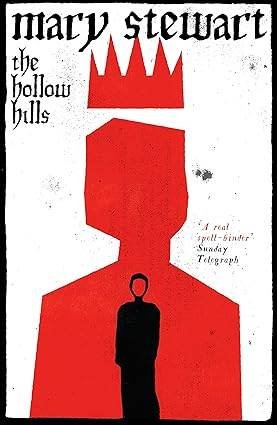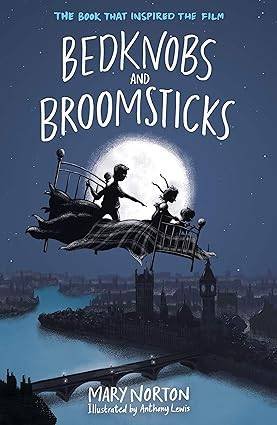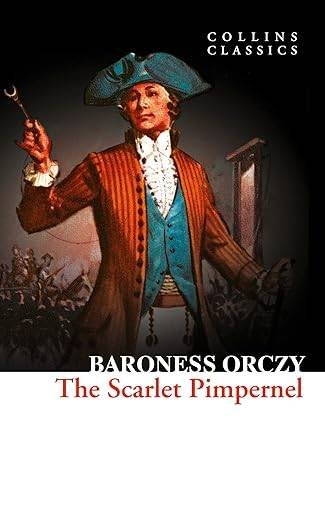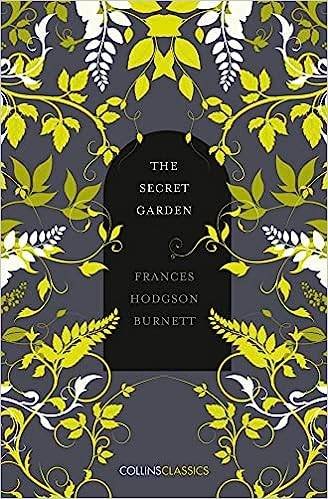Home » Book Reviews » Francis Iles » Malice Aforethought by Francis Iles
Possible spoilers ahead
This is the final book for me to read from the ‘four essential mystery stories’ as listed by Sinclair Lewis (the others being Bleak House by Charles Dickens, The Lodger by Marie Belloc Lowndes, and The Nine Tailors by Dorothy Sayers). The book begins very enticingly with ‘It was not until several weeks after he had decided to murder his wife that Dr Bickleigh took any active steps in the matter’, oooh, that’s a dramatic opening! I can’t wait to read further!
Sinclair Lewis, an American novelist who died in 1951, stated about his ‘four essential mystery stories’ that they were, “authentic literature, shrewd and competent writing with that power of suggesting more than is said, of awakening the emotions and the imagination”. I can already see why this book is in the list, as it is unusual in that the reader knows who the murderer is right from the start so it seems more of a psychological suspense story rather than a whodunnit, and from what I’ve learnt (carefully looking online, so as not to spoil anything!) this book was one of the first to take this approach of announcing the murderer at the beginning of the story.
The story begins with Dr Edmund Bickleigh’s wife, Julia, nagging him to do various jobs in readiness for a garden party she has arranged, regardless of the fact he has been busy working in his GP surgery that day. Julia is from a socially important family, the Crewstantons, and she regularly reminds Edmund that she married beneath her. They live in Wyvern’s Cross in Devon, and the garden party has been arranged in order to introduce a new resident to the neighbourhood, 22 year old Miss Madeleine Cranmere, who is rich and single but has already caused some disapproval by moving into The Hall and living there alone with no aunt or friends with her. Julia and the local priest, Rev Hessary Torr, are determined to advise Madeleine on the impropriety of this. Ooooh, it all seems to be brewing nicely into a scene of resentment! And Julia is very much the archetypal bossy wife characteristic in books, by being older than her husband and taller than him and with them having no children so all her focus is on her husband and correcting his faults!
It is known by the neighbours that Edmund very much admires Gwynyfryd Rattery. Over the ten years he has been married to Julia, he has regularly felt an attraction for other women and been convinced that each one was the woman he should have married, he has flirted with each of them and tried to tempt them into a relationship and he has been successful in most of these attempts but not with Gwynyfryd who seems shocked and offended at his advances. After being rejected again by her at the garden party, he returns to the main crowd and is immediately ordered by Julia in a bossy voice to complete a menial task, so he feels humiliated infront of the others, especially with this coming straight after his humiliation from Gwynyfryd. He feels very angry, and determines then to kill his wife, as he knows that divorcing her would not be a possibility and would also ruin his social standing so he feels killing her is the only option. Phew, we’re straight into it, and I guess we now see his planning and attempt(s) at killing her. And I immediately liked the dry humour in the book, such as ‘the two ladies whom Mrs Torr had determinedly held in the rose garden…were at last released, and streaked for the deckchairs and the shade like two terriers’. And ‘Miss Wapsworthy had passed the age when she could appear on a tennis court, and though Miss Peavy did not privately think that she had, it had been borne in upon her that others did’. And “My wife, do you mean?”, Mr Torr’s tone was unflatteringly dubious’. And even Edmund himself made me chuckle regarding his thoughts of murdering his wife as ‘wistful cogitation’! And I’m sorry to say, I can’t be on Julia’s side as ‘not being a reader herself, Julia always seemed to make a point of letting anyone else do so for no more than five minutes without interruption’! Well, I don’t think much more motive is needed, tee hee!
Edmund is aware he has an inferiority complex, he feels that this is because he is a short man and comes from trade as his father was a chemist. He was educated to be a doctor and has kept hidden his father’s trade from the neighbours, but in their Devon village a person’s gentility and family and social standing is very highly valued, and he is conscious he has not been to Oxford or Cambridge and doesn’t have a high-standing family going back generations, and obviously his wife reminds him on a daily basis that he is socially inadequate to her and not a gentleman. Hmmm, all this background is interesting, and I presume attempts to demonstrate to the reader how Edmund has found himself in the position of seriously contemplating murdering his wife, with the pressures and unhappiness he has to deal with and the feelings of being inferior and that life hasn’t been fair to him, all of which have accumulated over many years. I wonder if we are going to end up feeling sorry for him and hoping he will escape detection.
Edmund has had various affairs with women and is currently having an affair with Ivy, though he wanted to drop her for Gwynyfred but Ivy suspected this and demanded to meet him and during her pleadings the thought went twice through his head that he could kill her in this lonely spot they have met in. He is then shocked at himself for thinking this. He then gets to know Madeleine Cranmere, she makes him feel important and listens to him and praises him, and he begins an affair with her. Julia tells him he can’t see Madeleine again, that she won’t tolerate him having an affair with Madeleine, like he has with the other women. Edmund had never been sure if Julia knew about his affairs or not. He disobeys Julia and continues to see Madeleine. Hmmm, Edmund thinking how easily he could have murdered Ivy, made me wonder if he may kill several women, not just his wife. And I did feel sorry for Julia a little, thinking of how awful it must be for her to know her husband finds other women attractive and has had affairs with them.
Julia has a headache one evening and asks Edmund for some tablets from his dispensary, he crushes up two morphia tablets in a glass of water for her as he wants her to go to bed and leave him in peace, and then decides to add two more. Ooooh, I am beginning to wonder if this is how he will murder her!
Ivy tells Edmund she is pregnant with his baby, he is angry and shocked and alarmed at what Madeleine will say about this and how this could damage their relationship. He firstly suggests to Ivy that she must have been with someone else, and then suggests he operate on her to abort the child, but she refuses. He remembers his thought the other day about killing her and decides he will do this. Then Ivy tells him she isn’t actually pregnant but just told him so in order to test if he loves her or not, which she now knows he doesn’t. He punches her in the face and leaves. He is later alarmed at the intensity of his rage. Later, Julia intimates she wants to discuss that evening Edmund’s continued visits to Madeleine at The Hall. He wishes she had a headache again so he could administer the morphia to send her to sleep early, and then decides to give her some trial medication he received a few years ago which wasn’t used as it was discovered that it caused violent headaches. He gives this to her and it succeeds in giving her a headache, so he then administers the morphia and she goes to bed without having the discussion. Oooh, the tension is cranking up now, there feels such tension underlying everything in the book. I am beginning to wonder just who Edmund will kill, if indeed he kills anyone. It seemed to be looking like Julia, but then there was his annoyance at Ivy, and if Madeleine refuses his advances after he has built her up in his mind into such an ideal woman I could potentially see him snapping and killing her! It almost makes me feel quite nervous reading the book, just waiting for him to snap and act.
Edmund is becoming obsessed with Madeleine and their affair together, and convinces himself that he will commit suicide if she finishes with him. She does tell him she can’t bear the dishonesty to Julia and says that they must finish, but then seems to relent in the face of his pleading. He decides to tell Julia about his love for Madeleine. When he does, Julia questions how this affair is any different to his other affairs, and she then lists all these affairs. She goes on to say that she has never loved him and will agree to divorce him if he and Madeleine still feel the same about each other in a year’s time, but that he will then have to support her (Julia) by paying her an allowance, so she advises that he think about how he could earn enough to pay her allowance as well as supporting himself and Madeleine, particularly if his reputation and therefore his GP practice is damaged by the divorce. Edmund is overjoyed and grateful to her. She says however that although he and Madeleine can see each other as much as they wish, they cannot sleep together during that year. Hmmm, so this seems to have saved Julia’s life (though she didn’t know she was in danger!) with her agreeing to a divorce and Edmund will then be free, although I worry slightly at how he will cope with the restriction she has put on him of not sleeping with Madeleine in that time. And oh dear, when Julia listed all of Edmund’s affairs and we could see just how many he had had, it did cause me to alter my opinion about him, he is not quite the beaten-down innocent man he first appeared. And I even began to feel fearful for Madeleine when she was sounding like she was going to finish with him, Edmund does seem like he could just snap at any moment!
The fact that Madeleine is rich and he could actually be living at The Hall seems to now first enter Edmund’s mind. It then begins to seem to him that Madeleine is playing with him, as she is angry that Edmund told Julia about their affair and then says she could never marry a divorced man as people would gossip, and Edmund doesn’t seem able to argue or reason with her. Julia goes to see Madeleine, and tells Edmund afterwards that Madeleine is a hypocrite and is untruthful and has no feelings for him and is just amusing herself, and that Madeleine is actually flirting with Denny and is just acting the whole time. Julia then goes on to say that she won’t divorce him as it doesn’t seem fair to let him be manipulated by this woman and make himself unhappy, though she is prepared to keep her promise in future if Edmund meets a nice girl. Edmund believes nothing of what Julia says about Madeleine, and tells himself he will kill Julia. He doesn’t view this as murder but sees it as just the only inevitable course open to him. He is determined to find the perfect undetectable method of committing this murder, to ensure he is not caught but also because he wants the satisfaction and pride of knowing he is more superior to other men by committing a successful murder and not being caught. Hmmm, allowing us to see these murderous thoughts and to be able to ponder if we can possibly understand his justifications for his proposed actions, feels quite fascinating! I feel like we are also being given the opportunity to try and understand how a seemingly normal (fictional!) person could contemplate murder and be comfortable with their actions. It does make me wonder why the book isn’t written in the first person, as we have Edmund’s thoughts (ie, he felt…he thought…he planned, etc) but they are distanced from us as we are being told by the author what Edmund is thinking and planning rather than him telling us what he is thinking and planning, so I’m intrigued why this distance was put in place and why it was written like this. Or does this method of not using the first person then remove the risk of an unreliable narrator, does it remove any doubt we might have about the accuracy of what Edmund truly thinks and feels?
Edmund decides to continue with his morphia plan but tells Julia that the morphia is to help her headaches, and (as he had hoped) she gradually becomes addicted to it. He then takes her to a specialist who can find no cause for her headaches but recommends a change of diet. Edmund then tells Julia that he can’t give her any more morphia injections as he fears she is getting addicted to it, and he is firm in his continuing refusal and then leaves the house on a made-up case and comes back to find Julia has (as he had hoped) injected the morphia herself. Next time she goes to the large town he sends her to the chemist with a signed order for several medications including a large order of morphia. He also speaks to Julia’s sister and brother, explaining about her addiction and that she injects herself secretly and that he’s discovered she has faked his signature in order to obtain a large order of morphia, and he urges her sister to look at the puncture marks on Julia’s arm for proof of this, which she does. Edmund then suggests to them that Julia needs to go and stay in a care home for a while. He is also quite distressed at the pain that Julia is in with these headaches, and begins to view it himself that killing her is putting her out of her misery. He is also feeling the strain of seeing her in so much pain and he has to force himself to sprinkle the headache medication over her food, so he is keen to kill her soon so this can be over. Phew, he’s planning it all out and laying the trail for her death to be believed as (presumably) her overdosing on morphia, shiver, shiver, he is clever!
He tells Julia that he is going on his rounds but sneaks back to the house and waits in his surgery, knowing that Julia will come in there for her morphia, which she does and he agrees to give it to her now saying he knows he’s not given her any for some time so there is no danger of her becoming addicted to it now. He fills the syringe with an overdose amount, gives the syringe to her to hold briefly so her fingerprints are on it, then he injects her and tells her to go to bed, knowing she will shortly be dead. He then sneaks back to where he has left the car, but it won’t start! He sees Ivy approaching and panics that being seen there by her will ruin his planned alibi, but he quickly decides this instead could be a good alibi so tells her that he’s been trying for ten minutes to start the car and asks her for the time. He then goes on his rounds, congratulating himself on what he has achieved, realising he has always been fearful of Julia and felt inferior to her and this is what has led him to kill her, but that he feels inferior no longer. Omg, omg, he’s done it, he’s killed her!! I began to doubt if he actually would, as we seemed to be so far into the book before it happened. Omg!!!
Edmund then heads to The Hall and is greeted by Denny who tells him that he and Madeleine are engaged and that she never really cared for Edmund but just felt under his power when she was with him, and she has written Edmund a note to this effect. Edmund storms into the room to confront Madeleine. He grabs her and she cries out that he is hurting her. He then tells her that Julia is dead and she starts screaming. The parlourmaid then arrives to say there’s been a phone call from Dr Bickleigh’s house and it’s bad news, which makes Madeleine scream even more. Omg, surely he’s messed up here, he’s effectively told Madeleine that he killed Julia, as how could he have known she was dead before it was announced by the parlourmaid? Plus he’s killed Julia in order to be with Madeleine and now Madeleine doesn’t want him! I’m quite relieved that Denny is there, otherwise I’d be fearful that he would kill Madeleine there and then. Omg, I can’t imagine what will happen now!
It is 13 months later and Edmund is living his life in Wyvern’s Cross enjoying his independence and doing as he wishes, grateful that he is alone and rid of both Julia and Madeleine, as Madeleine is now married to Denny. There is a tea party with the neighbours and they are gossiping about Julia’s death, saying the coroner should have investigated more, that they can’t believe Julia was addicted to drugs and suspecting that she actually committed suicide due to Edmund having an affair with Madeleine. Oh dear, so the neighbours are suspicious of Julia’s death, but interestingly not suspecting murder but instead suspecting suicide (although I suppose to suspect murder is a big leap that most people wouldn’t naturally jump to!). And obviously Edmund’s blunder in revealing to Madeleine that Julia was dead, before it was announced by the parlour maid, seems to have been overlooked by Madeleine.
Ivy and her new husband, William Chatford, are at the tea party. William hates Edmund after he discovered that Ivy was Edmund’s lover before she married him, and he also makes Ivy’s life a misery by constantly making her feel guilty about this. William is a solicitor, and later goes to the local priest and to Scotland Yard and to Madeleine for more information about Julia’s death. Madeleine repeats to William the story that she has told the villagers, which is that she was seduced by Edmund but then came to her senses and ended it. Oh dear, William having a grudge against Edmund and being suspicious of Julia’s death doesn’t bode well…! But when William questioned Madeleine about Julia’s death, why did she not mention the fact that Edmund seemed to know that Julia was dead before it was announced to him, has Madeleine never mentioned this to anyone or seen the significance of this? And has Edmund forgotten too that he said it? I hope the author hasn’t forgotten!
Ivy asks to meet Edmund and informs him of William’s hatred for him and his determination to investigate Julia’s death. Edmund isn’t seriously worried about William’s investigations but enjoys secretly punishing him by seducing Ivy again and getting her to pass him information on William, Edmund also reminds Ivy of the time she saw him with the car on the day of Julia’s death. He decides to murder both Madeleine and William as he hates them both and is confident in his superiority to avoid detection, he feels like a superman with his subtle and clever schemes to avoid detection, and scorns those murderers who employ brutal methods like guns and knives as he views himself as an artist and is even slightly regretful that he can’t show his artistic triumph in murder to others. Oh god, don’t try more murder, it can only surely go wrong, and it makes me nervous how self-confident he is as I fear this could cause him to be overconfident and careless (which all sounds bizarre, I know, as it’s not like I think he should get away with murder!).
One of Edmund’s patients, a young boy, contracts botulism food poisoning and dies from this, so Edmund breeds a culture of it from the boy and then invites Madeleine and Denny and William to tea, telling William he wants to discuss legal matters and telling Madeleine and Denny he wants to put the past behind them and become friends. Hmmm, it seemed a little strange to me inviting Madeleine and William to the same tea as I’d have thought both would think it odd to see the other one there. But I guess this is explained by Edmund telling William that Madeleine and Denny just dropped in earlier, and also then saves him from having to speak about legal matters with William as there are other guests there. And I wondered why William accepted the invitation to tea, with him hating Edmund, even if this was described as being business, but did he accept the invitation in order to try and discover more evidence against Edmund? I feel Edmund should be more aware of the danger that William represents to him.
Edmund spreads the botulism culture on two of the potted meat sandwiches and presents these on the side of the plate that he offers to Madeleine and William. He is cold and remorseless when he watches them eat death, thinking they deserve death more than Julia did and even saying to himself that it was Madeleine who effectively caused Julia’s death. He is also smug and self-congratulatory afterwards when he asks the housekeeper if she thinks that the jar of potted meat smells a little strange and then insisting that it should be thrown out immediately, and then putting a little of the botulism culture into the jar. Madeleine is ill but recovers, and Edmund then decides that she can be allowed to live. However he is determined that William will die and after phoning the house and learning that William is ill he asks if he can visit or treat him, planning to then administer more of the botulism culture, but is denied access which infuriates him. Hmmm, so he is seeing William as a threat. But him trying to gain access to William in order to administer more of the poison just seems dangerous, and I wonder too if William suspects Edmund and is even trying to trap him as if poison is found at William’s house after Edmund’s visit then it will surely demonstrate Edmund’s guilt.
Meanwhile a detective from Scotland Yard comes to Edmund’s house, he is very apologetic but says he has to investigate some rumours about his wife’s death. Edmund is firstly shocked, but then feels his superiority and cleverness in comparison with the police officer. The police officer asks lots of detailed questions about the morphia and Julia’s access to it, he takes away the note she took to the chemist with Edmund’s supposedly forged signature on it, he also questions Edmund’s movements that day and Edmund shows his log of the patients and mentions seeing Ivy in the road, the police officer also asks if there is arsenic on the premises and if Julia could have taken this, he also searches the house and goes up in the attic where the incubator containing the botulism culture is, although he seems not to notice this. Edmund, feeling over-confident, tells the police officer that he knows it is William spreading these rumours and tells him about the affair with Ivy and the information Ivy has brought to him, and asks if he should bring a case against William for slander. Hmmm, I am beginning to wonder if this self-confidence could actually trip Edmund up. And a detective from Scotland Yard, this seems serious! And if this is William who has convinced the detective to investigate then this has presumably happened even before Edmund has attempted to poison William and Madeleine, which could then just bring a lot more suspicion on Edmund, oh dear, I can see things falling down around Edmund’s ears!
Edmund congratulates himself on his cleverness, but later that night is full of self-doubt and terror feeling certain he has given himself away and that the police suspect him of murder, hence the arsenic questions, and that he will hang. He debates whether he is being foolish and putting himself in danger trying to pursue getting into William’s bedroom to administer more of the botulism culture, but decides he must. Hmmm, Edmund’s feelings of self-doubt and panic are interesting as this seems to be the first time he has doubted himself, though I note these feelings had gone the next morning and he was back to his usual overconfident self!
Edmund goes to William’s GP, Lydston, who firstly presumes Edmund has come because the police officer has also spoken to Lydston about his examination of Julia both before and after death, but Edmund brushes over this as he is so fixated on gaining access to William. Lydston is offended at Edmund’s enquiries about the treatment of his patient, but Edmund explains that he and Madeleine had both felt unwell after the tea party and he self-treated himself and is keen to judge William’s symptoms and offer suggestions of help if they are the same as his were. Lydston again refuses, but then later phones Edmund up saying he and William have agreed that Edmund can visit him. Hmmm, why has William agreed to this? I can’t help thinking he suspects Edmund and is laying a trap for him!
Edmund puts the botulism culture in a capsule. When Edmund visits William, he looks very ill. Edmund explains his botulism idea and says how he treated himself, and gives Lydston the capsule to give to William, which he does. Edmund then begins to consider whether he should try to kill Lydston as well. Omg, I am beginning to get a feeling of dread here, and ridiculously I feel very tense and on edge and with my stomach in knots! I am worrying that somehow William knows that Edmund had tried to poison him and he is letting Edmund incriminate himself more and more. I don’t see quite how William could have guessed this, but it is odd that he sent Ivy away suddenly to apparently visit relatives in Spain, and that William firstly firmly refused admittance to Edmund and has now agreed, and that Lydston firstly refused and then agreed. And Edmund seems to be putting himself at risk and not thinking as clearly and calmly and calculatingly as he did before, he is acting impulsively and saying things impulsively with his eagerness and over-confidence. I even feel quite apprehensive at reading further and potentially seeing Edmund get caught! And I really don’t know why I am feeling concerned for Edmund, he’s not a nice man anyway, plus he is a murderer and has attempted to murder two more people! But somehow (maybe because we’re privy to Edmund’s thoughts?) I am almost hoping he gets away with it! This really is brilliant writing, it draws you in and racks up the tension!
Edmund realises the only evidence against him is the incubator so goes to the attic to destroy this. But it is gone! His housekeeper says someone came today to fix the cistern. Edmund guesses that this must have been the police. He begins to panic again, going over what he said to Lydston. The police then arrive and spend hours taking a detailed statement from him, questioning him about Julia, and about William and Madeleine being ill. Edmund is confident with the answers he gives, even stating that he was sending away a botulism culture in a capsule for testing, thinking that if they know of the capsule he gave to William then he could say the capsules must have somehow got accidentally switched. However, Edmund is arrested for attempting to murder William and Madeleine by administering poison germs, and for murdering his wife! Omg, omg, omg! My heart nearly stopped when he went to the attic and the incubator was gone. And so this is it, he is discovered. I can’t really see how he can avoid being found guilty now.
It is Edmund’s trial, and he alternates between despairing and then feeling hopeful regarding the verdict. His lawyer manages to dispense with Madeleine’s testimony of Edmund knowing Julia had died before he could have officially known, by calling into question other statements she’d made that were shown to be exaggerations or lies, and painting her out to be slightly insane. Julia’s body is exhumed and she is shown to have died of a morphia overdose, not arsenical poisoning as the police suspected. However there are traces of elements from the drug that Edmund had given her to bring on her headaches, but his lawyer dispenses with this by saying that Edmund had openly bought more of this drug and was using it to try to treat Julia’s headaches with. It is also mentioned that Madeleine’s husband, Denny, has been ill and then dies with typhoid, and Edmund presumes he contracted typhoid from the poor sanitation and drainage at the Hall, which he had warned Madeleine about many times. Well, Edmund’s lawyer seems very good and managed very efficiently to get rid of the difficulty of Edmund telling Madeleine about Julia’s death before he should have known about it. And interesting that the police’s view was that Edmund poisoned Julia with arsenic, which of course he didn’t as it was the morphia overdose that killed her which he had made people believe she took herself. And there even seems a viable explanation for the presence of the headache tablets. Hmmm, I’m beginning to wonder if he will get away with this! I don’t quite see the relevance yet (if there is any) of Denny dying of typhoid though.
The jury is then told that the germs in Edmund’s incubator aren’t botulism but are other forms of germs, and this seems to help clear Edmund of the charge of trying to poison William, and Edmund’s suggestion to Lydston that William had botulism appears to then just be a mistaken assumption on Edmund’s part. The jury is also told that William and Lydston had suspected Edmund of murdering Julia by arsenical poisoning, and that Lydston deliberately falsely described Willam’s symptoms to Edmund as arsenical poisoning in the hope of encouraging Edmund to then give himself away. The jury are also told that William suspected that Edmund would give him and Madeleine arsenic at the tea party but they were urged by the police to attend the tea party so as to avoid Edmund getting suspicious that he was being investigated for Julia’s death. Hmmm, I did get confused here with a few things! So regarding the germs in Edmund’s incubator, was Edmund wrong about the boy dying of botulism, did he die of something else that Edmund had then saved in the culture and then fed to Madeleine and William? I was also confused about the tea party, so did William (and potentially also Madeleine) deliberately eat the sandwiches though they suspected they were poisoned, in order to gain proof against Edmund? It seems a huge risk to eat poisoned food, unless they had an antidote they could take but even then it would surely still be very risky? And it’s seeming like the jury are being led to believe that William and Lydston were victimising Edmund and trying to set him up, so I guess they are also looking a little crazy, like Madeleine was made to look a little crazy, and therefore Edmund is potentially coming across as the victim of people’s vendettas, which is amazing considering we know he has done all the things he is being accused of! The trial is quite dramatic to read and I find myself rooting for Edmund and being scared he will be found guilty, which is really bizarre and I struggle to understand just how the author has made me feel this, it’s like the author is playing with my mind, it’s extremely clever writing! I can see the verdict is coming on the next page, and I’ve even had to put my hand over the page so my eye doesn’t sneak a peek at whether the jury announces him guilty or not guilty!
Edmund is found not guilty of murdering his wife! But he is then arrested and executed for the murder of Denny by poisoning him with typhoid, as the germs that Edmund had grown in the incubator (which he thought were botulism) were actually typhoid. What?!! That seems a very ironic twist at the end, with Edmund escaping justice for the crimes he did commit, but then being found guilty of another murder. And he didn’t murder Denny, did he? I presume as Edmund had been so honest (in his thoughts) regarding all his other murderous intentions, then he would surely have mentioned this plan of murdering Denny, if this was what he did. Hmmm, I felt a bit dissatisfied at the ending as I’m not sure exactly what happened, which is very annoying! I am completely confused about the germs in Edmund’s incubator (and as this seems crucial to the ending, it’s very frustrating!), so the boy died of typhoid not botulism so Edmund had taken typhoid germs from the boy not the botulism germs he thought they were, he then tried to poison William and Madeleine with what he thought was botulism (and what William suspected was arsenic) but was actually typhoid? And because Denny coincidentally dies of typhoid, it is presumed that Edmund tried to poison William and Madeleine and also Denny with typhoid and the twist is that he is then found guilty of Denny’s murder which is the only one he didn’t commit or attempt to commit? I think I’ll have to re-read the trial bit again, as it was tense and I realise I was racing through it so maybe I missed crucial information. But wow, that was certainly a mammoth twist at the end! I was wondering if there may possibly be the twist that Edmund got away with his crimes so we are left wondering if he ever attempts murder again, but I certainly didn’t expect the twist of having the murderer walk out of court a free man and then to be arrested for another crime that he (I think!) didn’t commit, I definitely didn’t see that final twist coming, and it is so very effective as I thought I had been told everything by being given the identity of the murderer at the start of the book, so I wasn’t expecting any surprises or twists at the end, very very clever indeed!
And the writing was just superb, I thought. I was continually fascinated by how the author wrote Edmund’s character, how the reader gradually learns his character and how his character alters throughout the book, or perhaps it’s rather that Edmund’s characteristics are always there but have been concealed by Edmund up to this point and they develop as Edmund adapts to the situations he faces. The reader first sees Edmund as the other neighbours see him with the side of himself he wants to show, and then the reader is privy to his thoughts and feelings so gets to know the real him, and it is also very effective having this ‘real’ him come out gradually rather than being obvious right from the beginning. At the start of the book, Edmund seems like someone deserving of our pity, as he is humiliated and made to feel inadequate by his bossy wife while always being polite and considerate to her in return, so we see Edmund’s patient and submissive character. We then learn about the social inequalities in his marriage and begin to suspect that he perhaps married Julia in order to achieve better social standing and money, so we see Edmund’s ambitious and driven and self-serving character. Then we learn about his numerous affairs and that he cruelly drops one woman for another when he is finished with them, so we see Edmund’s sneaky and lying and careless and cruel character. Then there are his feelings of rage against Ivy and his contemplation of killing her and him punching her in the face, so we see Edmund’s violent and coldly determined character. Then we see how he acts with Madeleine, being infatuated and bossed around and blinded by her, so we see Edmund’s foolish and gullible character. And of course we see Edmund’s murderous character when he kills Julia! Then there are his feelings of superiority, viewing himself like a ‘superman’ for getting away with Julia’s murder, so we see Edmund’s arrogant and egotistical character, and also his self-delusional character with the way he convinces himself that Julia’s end is actually a kindness! Then he manipulates poor Ivy again in order to gain information about her husband’s suspicions of him and he also abuses her to make himself feel superior, so we see Edmund’s spiteful and malicious character. Then he attempts to kill Madeleine and William and is self-congratulatory and smug afterwards and feels that he has the power to determine if people live or die, so we see Edmund’s narcissistic character. Then he is patronising towards the police officer, and we begin to see how Edmund’s character will likely bring about his downfall. It is very very clever how the author gradually, step by step, changes the picture of Edmund’s character and lets him degenerate infront of our eyes. And yet also very very clever how the author somehow encouraged a part of me to still like Edmund and to be entertained and fascinated by him, he still had a charm and I found myself (bizarrely!) concerned about pitfalls he could face and worrying that he would make a mistake and be caught!
This is an absolutely fascinating read, with it being an insight into what influences a (fictional!) murderer, the clever drawn-out development of his character, and the way the author seemed to be able to influence my thoughts about the murderer, plus the huge twist at the end (even though I don’t quite fully understand it!). And we are familiar now with books which reveal the murderer at the start, but I can imagine this book caused quite a sensation when it was published for being one of the first to do this. I am very impressed by this writer and will look out for more of his books, I am aware that his real name was Anthony Berkeley so I wonder if he wrote this psychological type of book under the name Francis Iles, so if I want to read more of the same then I must read ones written by Francis Iles, such as Before The Fact. But I’m also keen to read some of the books written under his real name too, which seem to have some great titles such as The Poisoned Chocolates Case, and The Silk Stocking Murders, and Jumping Jenny, they all sound very intriguing!
